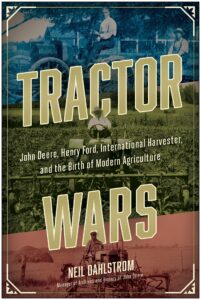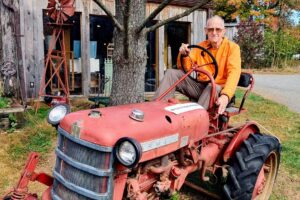 There’s something about tractors that draws a boy’s attention. I learned to drive in the 1960s on a 1948 Farmall Cub on my grandfather’s land in Vermont, and at a recent visit to a farm stand, I was delighted to find an almost identical, so it’s not surprising that Tractor Wars caught my eye.
There’s something about tractors that draws a boy’s attention. I learned to drive in the 1960s on a 1948 Farmall Cub on my grandfather’s land in Vermont, and at a recent visit to a farm stand, I was delighted to find an almost identical, so it’s not surprising that Tractor Wars caught my eye.
In Tractor Wars, Neil Dahlstrom gives us an inside look at the birth of the farm tractor starting in the late 1800s and culminating with Ford’s transition to overseas manufacturing in Ireland at the end of the 1920s. Drawing heavily on biographies, board room records, and newspaper clippings, the book’s focus is on corporate strategies, alliances, and competitions. Readers may be surprised to discover how late to the game John Deere was, but not especially surprised that when Henry Ford entered the fray with his Fordson tractor, his techniques of mass production and ruthless pricing gave him immediate dominance in the field(s).
While the focus is on the competition, largely between Harvester (which became International Harvester), Deere, and Ford, what I found most interesting was how the story of the tractor meshed with other events. The rise of an industrialized economy and the outbreak of war in Europe meant the beginning of the exodus from the farm, and the tractor was a large part of the mechanization of agriculture that allowed for much larger yields and reduced labor. Henry Ford, who looms large in this tale, grew up on a farm but had no love for farming and was frustrated by the inefficiencies he saw in farm practice. Not only did he want to make farming a modern business, but he wanted to free the agricultural workforce to work in factories.

Though it came almost 10 years after the tractors covered in Tractor Wars, the International Harvester Farmall Cub holds a special place in my memory.
At the turn of the century, horse and mule were the rule in farming, but over the next two decades, the adoption of power machinery lead to bigger farms and paved the way to modern agribusiness. Ford, always the champion of the average buyer produced a smaller tractor than Harvestor, or eventually, Deere. Aimed at the small farm and priced to be affordable to anyone his Fordson tractor would dominate sales for over a decade.
Neil Dahlstrom puts human faces on the drama in a very readable way. I would have liked more about the technical evolution of the machines, but if it’s not the main thrust it’s not neglected. The text is about the companies and the men that ran them, but the story is set against the rise of the industrial age, which it shows from a unique perspective.